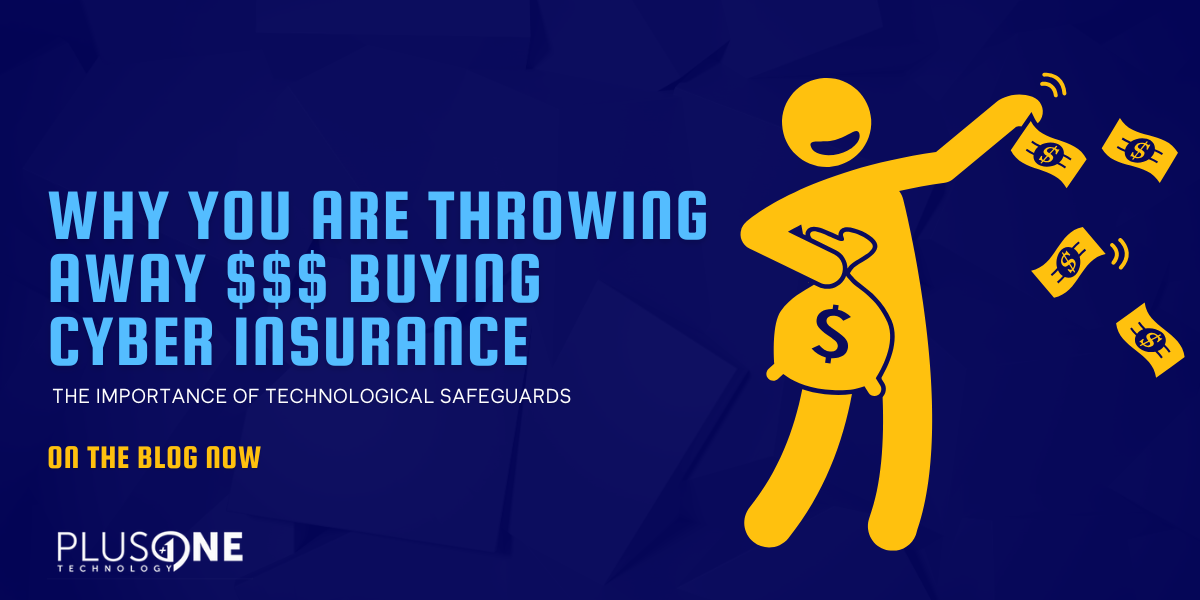Understanding the Importance of Technological Safeguards
Cyber insurance has become a necessity for businesses of all sizes. The thought of having a safety net in case of a cyber attack is reassuring. However, many companies are unwittingly wasting thousands of dollars on cyber insurance premiums because they fail to implement the necessary technological safeguards required by insurance providers. This blog post will delve into why having cyber insurance without the proper security measures is akin to just lighting your money on fire, and what common requirements you need to meet to ensure your policy is valid.
The Importance of Technological Safeguards
When you purchase cyber insurance, you are essentially entering into a contract with the insurance company. This contract stipulates that you must maintain certain security protocols to qualify for coverage. If you fail to implement these safeguards, you risk having your claims denied in the event of a breach. Cyber insurance providers are meticulous about enforcing these requirements because they reduce the risk of a claim being filed.
In the event of a cyber incident, if the insurance company discovers that you were untruthful or negligent in maintaining these safeguards, your claim could be rejected. This leaves your business vulnerable and unprotected, despite having paid substantial premiums.
Common Requirements of Cyber Insurance Companies
To ensure that your cyber insurance policy is effective and that your claims will be honored, it is crucial to understand and implement the technological safeguards required. We will review the most common requirements but you should always consult with your agent or insurance company to ensure you have the required technological safeguards for your policy. Here are the most common requirements:
Multi-Factor Authentication (MFA)
Multi-factor authentication (MFA) is a security system that requires more than one method of authentication to verify a user’s identity. This typically includes something the user knows (password), something the user has (a smartphone or hardware token), and something the user is (fingerprint or facial recognition). MFA is a fundamental security measure that significantly reduces the likelihood of unauthorized access to your systems. Most cyber insurance policies mandate the use of MFA for accessing sensitive systems and data.
Security Operations Center (SOC) Protection
A Security Operations Center (SOC) is a centralized unit that deals with security issues on an organizational and technical level. A SOC monitors and analyzes an organization’s security posture on an ongoing basis. Cyber insurance providers often require businesses to have SOC protection in place to detect and respond to potential threats in real-time. SOCs employ advanced technologies and skilled personnel to ensure that your security infrastructure is robust and responsive. SOC protection is typically provided by your MSP partner.
Cyber Security Awareness Training
Human error is one of the leading causes of cyber breaches. To mitigate this risk, cyber insurance companies often require businesses to conduct regular cybersecurity awareness training for their employees. This training educates staff on the latest security threats, safe online practices, and how to recognize and respond to potential cyber incidents. Ensuring that your team is well-informed and vigilant is a critical component of maintaining a secure environment.
Regular Security Audits and Assessments
Regular security audits and assessments are essential for identifying and addressing vulnerabilities in your systems. Cyber insurance providers typically require businesses to conduct these audits to ensure that their security measures are up to date and effective. These assessments can be performed internally or by third-party experts and should cover all aspects of your IT infrastructure, including software, hardware, and network security.
Endpoint Protection
Endpoint protection involves securing all endpoints or entry points of end-user devices such as desktops, laptops, and mobile devices. Antivirus software, firewalls, and intrusion detection/prevention systems are all components of endpoint protection. Cyber insurance companies often require businesses to have comprehensive endpoint protection in place to prevent malware and other malicious activities from compromising their systems. Most companies require “next-gen” endpoint protection that is provided from companies such as Sentinel One, Huntress, or others. Standard AV packages from Norton, McAfee, Avast, and other traditional anti-virus packages are no longer considered enough protection.
Data Encryption
Data encryption is the process of converting data into a code to prevent unauthorized access. Encrypting sensitive data both at rest and in transit is a common requirement for cyber insurance policies. This ensures that even if data is intercepted or accessed by unauthorized individuals, it remains unreadable and secure. Bitlocker is a common encryption tool and can be enforced in Microsoft 365.
The Consequences of Non-Compliance
Failing to comply with these requirements can have severe consequences. If a cyber attack occurs and the insurance company discovers that you did not have the necessary safeguards in place, your claim will likely be denied. This means that you will bear the full financial burden of the breach, including legal fees, notification costs, and potential fines.
Additionally, the reputational damage from a cyber breach can be devastating. Customers and partners may lose trust in your ability to protect their data, leading to a loss of business and revenue. In some cases, regulatory bodies may impose penalties for failing to adhere to data protection laws, further compounding the financial impact.
Conclusion
Investing in cyber insurance is a prudent decision for any business, but it is not a substitute for robust cybersecurity measures. To ensure that your policy is effective and that your claims will be honored, you must implement the technological safeguards required by your insurance provider. By doing so, you protect your business from the financial and reputational fallout of a cyber breach and ensure that your investment in cyber insurance is not wasted.
Remember, cyber insurance is a partnership between you and the insurance company. By fulfilling your obligations and maintaining a strong security posture, you can rest assured that your business is protected and that your claims will be honored in the event of an incident.







